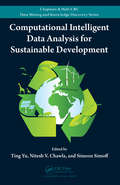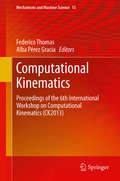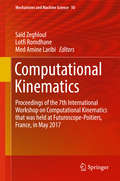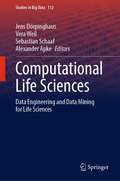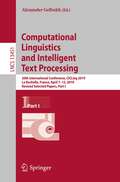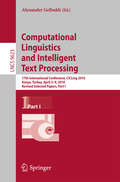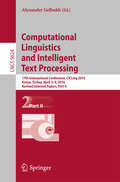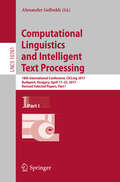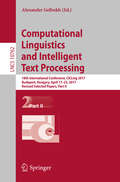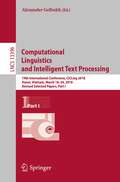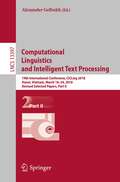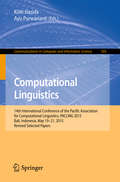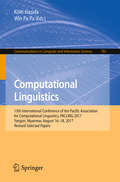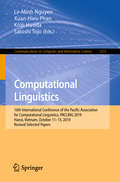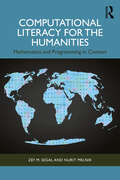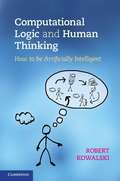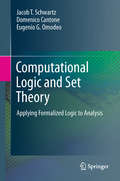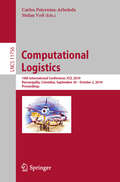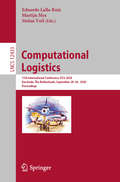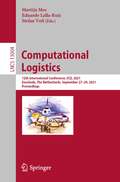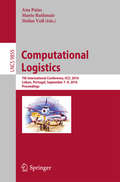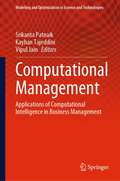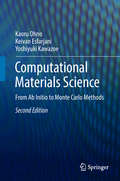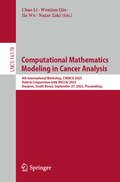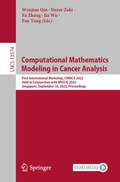- Table View
- List View
Computational Intelligent Data Analysis for Sustainable Development (Chapman & Hall/CRC Data Mining and Knowledge Discovery Series)
by Ting Yu Simeon Simoff Nitesh V. ChawlaGoing beyond performing simple analyses, researchers involved in the highly dynamic field of computational intelligent data analysis design algorithms that solve increasingly complex data problems in changing environments, including economic, environmental, and social data. Computational Intelligent Data Analysis for Sustainable Development present
Computational Kinematics: Proceedings of the 6th International Workshop on Computational Kinematics (CK2013) (Mechanisms and Machine Science #15)
by Federico Thomas Alba Pérez GraciaComputational kinematics is an enthralling area of science with a rich spectrum of problems at the junction of mechanics, robotics, computer science, mathematics, and computer graphics. The covered topics include design and optimization of cable-driven robots, analysis of parallel manipulators, motion planning, numerical methods for mechanism calibration and optimization, geometric approaches to mechanism analysis and design, synthesis of mechanisms, kinematical issues in biomechanics, construction of novel mechanical devices, as well as detection and treatment of singularities. The results should be of interest for practicing and research engineers as well as Ph. D. students from the fields of mechanical and electrical engineering, computer science, and computer graphics.
Computational Kinematics: Proceedings of the 7th International Workshop on Computational Kinematics that was held at Futuroscope-Poitiers, France, in May 2017 (Mechanisms and Machine Science #50)
by Saïd Zeghloul Med Amine Laribi Lotfi RomdhaneThis is the proceedings of IFToMM CK 2017, the 7th International Workshop on Computational Kinematics that was held in Futuroscope-Poitiers, France in May 2017. Topics treated include: kinematic design and synthesis, computational geometry in kinematics, motion analysis and synthesis, theory of mechanisms, mechanism design, kinematical analysis of serial and parallel robots, kinematical issues in biomechanics, molecular kinematics, kinematical motion analysis and simulation, geometric constraint solvers, deployable and tensegrity structures, robot motion planning, applications of computational kinematics, education in computational kinematics, and theoretical foundations of kinematics. Kinematics is an exciting area of computational mechanics and plays a central role in a great variety of fields and industrial applications nowadays. Apart from research in pure kinematics, the field deals with problems of practical relevance that need to be solved in an interdisciplinary manner in order for new technologies to develop. The results presented in this book should be of interest for practicing and research engineers as well as Ph. D. students from the fields of mechanical and electrical engineering, computer science, and computer graphics.
Computational Life Sciences: Data Engineering and Data Mining for Life Sciences (Studies in Big Data #112)
by Jens Dörpinghaus Vera Weil Sebastian Schaaf Alexander ApkeThis book broadly covers the given spectrum of disciplines in Computational Life Sciences, transforming it into a strong helping hand for teachers, students, practitioners and researchers. In Life Sciences, problem-solving and data analysis often depend on biological expertise combined with technical skills in order to generate, manage and efficiently analyse big data. These technical skills can easily be enhanced by good theoretical foundations, developed from well-chosen practical examples and inspiring new strategies. This is the innovative approach of Computational Life Sciences-Data Engineering and Data Mining for Life Sciences: We present basic concepts, advanced topics and emerging technologies, introduce algorithm design and programming principles, address data mining and knowledge discovery as well as applications arising from real projects. Chapters are largely independent and often flanked by illustrative examples and practical advise.
Computational Linguistics and Intelligent Text Processing: 20th International Conference, CICLing 2019, La Rochelle, France, April 7–13, 2019, Revised Selected Papers, Part I (Lecture Notes in Computer Science #13451)
by Alexander GelbukhThe two-volume set LNCS 13451 and 13452 constitutes revised selected papers from the CICLing 2019 conference which took place in La Rochelle, France, April 2019.The total of 95 papers presented in the two volumes was carefully reviewed and selected from 335 submissions. The book also contains 3 invited papers. The papers are organized in the following topical sections: General, Information extraction, Information retrieval, Language modeling, Lexical resources, Machine translation, Morphology, sintax, parsing, Name entity recognition, Semantics and text similarity, Sentiment analysis, Speech processing, Text categorization, Text generation, and Text mining.
Computational Linguistics and Intelligent Text Processing: 16th International Conference, Cicling 2015, Cairo, Egypt, April 14-20, 2015, Proceedings, Part I (Lecture Notes in Computer Science #9041)
by Alexander GelbukhThe two-volume set LNCS 9623 + 9624 constitutes revised selected papers from the CICLing 2016 conference which took place in Konya, Turkey, in April 2016. The total of 89 papers presented in the two volumes was carefully reviewed and selected from 298 submissions. The book also contains 4 invited papers and a memorial paper on Adam Kilgarriff’s Legacy to Computational Linguistics. The papers are organized in the following topical sections: Part I: In memoriam of Adam Kilgarriff; general formalisms; embeddings, language modeling, and sequence labeling; lexical resources and terminology extraction; morphology and part-of-speech tagging; syntax and chunking; named entity recognition; word sense disambiguation and anaphora resolution; semantics, discourse, and dialog. Part II: machine translation and multilingualism; sentiment analysis, opinion mining, subjectivity, and social media; text classification and categorization; information extraction; and applications.
Computational Linguistics and Intelligent Text Processing: 16th International Conference, Cicling 2015, Cairo, Egypt, April 14-20, 2015, Proceedings, Part I (Lecture Notes in Computer Science #9041)
by Alexander GelbukhThe two-volume set LNCS 9623 + 9624 constitutes revised selected papers from the CICLing 2016 conference which took place in Konya, Turkey, in April 2016. The total of 89 papers presented in the two volumes was carefully reviewed and selected from 298 submissions. The book also contains 4 invited papers and a memorial paper on Adam Kilgarriff’s Legacy to Computational Linguistics. The papers are organized in the following topical sections: Part I: In memoriam of Adam Kilgarriff; general formalisms; embeddings, language modeling, and sequence labeling; lexical resources and terminology extraction; morphology and part-of-speech tagging; syntax and chunking; named entity recognition; word sense disambiguation and anaphora resolution; semantics, discourse, and dialog. Part II: machine translation and multilingualism; sentiment analysis, opinion mining, subjectivity, and social media; text classification and categorization; information extraction; and applications.
Computational Linguistics and Intelligent Text Processing: 18th International Conference, CICLing 2017, Budapest, Hungary, April 17–23, 2017, Revised Selected Papers, Part I (Lecture Notes in Computer Science #10761)
by Alexander GelbukhThe two-volume set LNCS 10761 + 10762 constitutes revised selected papers from the CICLing 2017 conference which took place in Budapest, Hungary, in April 2017. The total of 90 papers presented in the two volumes was carefully reviewed and selected from numerous submissions. In addition, the proceedings contain 4 invited papers.The papers are organized in the following topical sections:Part I: general; morphology and text segmentation; syntax and parsing; word sense disambiguation; reference and coreference resolution; named entity recognition; semantics and text similarity; information extraction; speech recognition; applications to linguistics and the humanities. Part II: sentiment analysis; opinion mining; author profiling and authorship attribution; social network analysis; machine translation; text summarization; information retrieval and text classification; practical applications.
Computational Linguistics and Intelligent Text Processing: 18th International Conference, CICLing 2017, Budapest, Hungary, April 17–23, 2017, Revised Selected Papers, Part II (Lecture Notes in Computer Science #10762)
by Alexander GelbukhThe two-volume set LNCS 10761 + 10762 constitutes revised selected papers from the CICLing 2017 conference which took place in Budapest, Hungary, in April 2017. The total of 90 papers presented in the two volumes was carefully reviewed and selected from numerous submissions. In addition, the proceedings contain 4 invited papers.The papers are organized in the following topical sections:Part I: general; morphology and text segmentation; syntax and parsing; word sense disambiguation; reference and coreference resolution; named entity recognition; semantics and text similarity; information extraction; speech recognition; applications to linguistics and the humanities. Part II: sentiment analysis; opinion mining; author profiling and authorship attribution; social network analysis; machine translation; text summarization; information retrieval and text classification; practical applications.
Computational Linguistics and Intelligent Text Processing: 19th International Conference, CICLing 2018, Hanoi, Vietnam, March 18–24, 2018, Revised Selected Papers, Part I (Lecture Notes in Computer Science #13396)
by Alexander GelbukhThe two-volume set LNCS 13396 and 13397 constitutes revised selected papers from the CICLing 2018 conference which took place in Hanoi, Vietnam, in March 2018.The total of 68 papers presented in the two volumes was carefully reviewed and selected from 181 submissions. The focus of the conference was on following topics such as computational linguistics and intelligent text and speech processing and others. The papers are organized in the following topical sections: General, Author profiling and authorship attribution, social network analysis, Information retrieval, information extraction, Lexical resources, Machine translation, Morphology, syntax, Semantics and text similarity, Sentiment analysis, Syntax and parsing, Text categorization and clustering, Text generation, and Text mining.
Computational Linguistics and Intelligent Text Processing: 19th International Conference, CICLing 2018, Hanoi, Vietnam, March 18–24, 2018, Revised Selected Papers, Part II (Lecture Notes in Computer Science #13397)
by Alexander GelbukhThe two-volume set LNCS 13396 and 13397 constitutes revised selected papers from the CICLing 2018 conference which took place in Hanoi, Vietnam, in March 2018.The total of 68 papers presented in the two volumes was carefully reviewed and selected from 181 submissions. The focus of the conference was on following topics such as computational linguistics and intelligent text and speech processing and others. The papers are organized in the following topical sections: General, Author profiling and authorship attribution, social network analysis, Information retrieval, information extraction, Lexical resources, Machine translation, Morphology, syntax, Semantics and text similarity, Sentiment analysis, Syntax and parsing, Text categorization and clustering, Text generation, and Text mining.
Computational Linguistics: 14th International Conference of the Pacific Association for Computational Linguistics, PACLING 2015, Bali, Indonesia, May 19-21, 2015, Revised Selected Papers (Communications in Computer and Information Science #593)
by Kôiti Hasida Ayu PurwariantiThis bookconstitutes the refereed proceedings of the 14th International Conference of the PacificAssociation for Computational Linguistics, PACLING 2015, held in Bali,Indonesia, in May 2015. The 18revised full papers presented were carefully reviewed and selected from 45papers. The papers are organized around the following topics: syntax andsyntactic analysis; semantics and semantic analysis; spoken language anddialogue; corpora and corpus-based language processing; text and messageunderstanding; information extraction and text mining; information retrievaland question answering; language learning; machine translation.
Computational Linguistics: 15th International Conference Of The Pacific Association For Computational Linguistics, Pacling 2017, Yangon, Myanmar, August 16-18, 2017, Revised Selected Papers (Communications In Computer And Information Science #781)
by Kôiti Hasida Win Pa PaThis book constitutes the refereed proceedings of the 15th International Conference of the Pacific Association for Computational Linguistics, PACLING 2017, held in Yangon, Myanmar, in August 2017.The 28 revised full papers presented were carefully reviewed and selected from 50 submissions. The papers are organized in topical sections on semantics and semantic analysis; statistical machine translation; corpora and corpus-based language processing; syntax and syntactic analysis; document classification; information extraction and text mining; text summarization; text and message understanding; automatic speech recognition; spoken language and dialogue; speech pathology; speech analysis.
Computational Linguistics: 16th International Conference of the Pacific Association for Computational Linguistics, PACLING 2019, Hanoi, Vietnam, October 11–13, 2019, Revised Selected Papers (Communications in Computer and Information Science #1215)
by Kôiti Hasida Satoshi Tojo Le-Minh Nguyen Xuan-Hieu PhanThis book constitutes the refereed proceedings of the 16th International Conference of the Pacific Association for Computational Linguistics, PACLING 2019, held in Hanoi, Vietnam, in October 2019. The 28 full papers and 14 short papers presented were carefully reviewed and selected from 70 submissions. The papers are organized in topical sections on text summarization; relation and word embedding; machine translation; text classification; web analyzing; question and answering, dialog analyzing; speech and emotion analyzing; parsing and segmentation; information extraction; and grammar error and plagiarism detection.
Computational Literacy for the Humanities: Mathematics and Programming in Context
by Zef Segal Nurit MelnikComputational Literacy for the Humanities provides an introduction to mathematics and programming that is specifically designed for use by those engaged in the humanities. Linking mathematical concepts and computational skills, the chapters in this book explore humanistic questions from diverse fields, such as art, history and literature.The book helps to advance computational and digital literacy by showing that each mathematical concept has a history, and each technique has a meaning. Rather than viewing mathematics and computer programming as purely instrumental, they are integrated into the process of achieving greater understanding of humanistic phenomena. Algorithms, data, statistics and networks are taught critically within the book, whilst the authors also make a concerted effort to expose the internal biases of these tools. They also demonstrate the applicability of quantification and computation for the promotion of diversification and inclusivity within the humanities. All exercises are designed as an opportunity to gain hands-on mathematical and computational experience, whilst critically exploring and interpreting humanistic phenomena.Computational Literacy for the Humanities shows readers how to engage with data in a way that is challenging, yet meaningful and empowering. It will be of interest to scholars and students working across the humanities and should be of particular interest to those working in digital humanities.
Computational Logic and Human Thinking
by Robert KowalskiThe practical benefits of computational logic need not be limited to mathematics and computing. As this book shows, ordinary people in their everyday lives can profit from the recent advances that have been developed for artificial intelligence. The book draws upon related developments in various fields from philosophy to psychology and law. It pays special attention to the integration of logic with decision theory, and the use of logic to improve the clarity and coherence of communication in natural languages such as English. This book is essential reading for teachers and researchers who may be out of touch with the latest developments in computational logic. It will also be useful in any undergraduate course that teaches practical thinking, problem solving or communication skills. Its informal presentation makes the book accessible to readers from any background, but optional, more formal, chapters are also included for those who are more technically oriented.
Computational Logic and Set Theory: Applying Formalized Logic to Analysis (Texts in Computer Science)
by Martin Davis Domenico Cantone Jacob T. Schwartz Eugenio G. OmodeoThis must-read text presents the pioneering work of the late Professor Jacob (Jack) T. Schwartz on computational logic and set theory and its application to proof verification techniques, culminating in the ÆtnaNova system, a prototype computer program designed to verify the correctness of mathematical proofs presented in the language of set theory. Topics and features: describes in depth how a specific first-order theory can be exploited to model and carry out reasoning in branches of computer science and mathematics; presents an unique system for automated proof verification in large-scale software systems; integrates important proof-engineering issues, reflecting the goals of large-scale verifiers; includes an appendix showing formalized proofs of ordinals, of various properties of the transitive closure operation, of finite and transfinite induction principles, and of Zorn's lemma.
Computational Logistics: 10th International Conference, ICCL 2019, Barranquilla, Colombia, September 30 – October 2, 2019, Proceedings (Lecture Notes in Computer Science #11756)
by Stefan Voß Carlos Paternina-ArboledaThis book constitutes the proceedings of the 10th International Conference on Computational Logistics, ICCL 2019, held in Barranquilla, Colombia, in September/October 2019. The 27 papers included in this book were carefully reviewed and selected from 49 submissions. They were organized in topical sections named: freight transportation and urban logistics; maritime and port logistics; vehicle routing problems; network design and distribution problems; and selected topics in decision support systems and ICT tools.
Computational Logistics: 11th International Conference, ICCL 2020, Enschede, The Netherlands, September 28–30, 2020, Proceedings (Lecture Notes in Computer Science #12433)
by Stefan Voß Eduardo Lalla-Ruiz Martijn MesThis book constitutes the proceedings of the 11th International Conference on Computational Logistics, ICCL 2020, held in Enschede, The Netherlands, in September 2020.The 49 papers included in this book were carefully reviewed and selected from 73 submissions. They were organized in topical sections named: maritime and port logistics; vehicle routing and scheduling; freight distribution and city logistics; network design and scheduling; and selected topics in logistics.Due to the Corona pandemic ICCL 2020 was held as a virtual event.
Computational Logistics: 12th International Conference, ICCL 2021, Enschede, The Netherlands, September 27–29, 2021, Proceedings (Lecture Notes in Computer Science #13004)
by Stefan Voß Eduardo Lalla-Ruiz Martijn MesThis book constitutes the refereed proceedings of the 12th International Conference on Computational Logistics, ICCL 2021, held in September 2021. Due to COVID-19 pandemic the conference was held virtually.The 42 full papers were carefully reviewed and selected from 111 submissions. They detail the interface of complex logistics systems and advanced computational methods from the fields of operations research, business analytics, and artificial intelligence. The papers are organized in topical sections named maritime and port logistics; supply chain and production management; urban transport and collaborative logistics; routing, dispatching, and scheduling; air logistics and multi-modal transport.
Computational Logistics: 7th International Conference, ICCL 2016, Lisbon, Portugal, September 7-9, 2016, Proceedings (Lecture Notes in Computer Science #9855)
by Ana Paias Mario Ruthmair Stefan VoßThis book constitutes the refereed proceedings of the 7th International Conference on Computational Logistics, ICCL 2016, held in Lisbon, Portugal, in September 2016. The 29 papers presented in this volume were carefully reviewed and selected for inclusion in the book. They are organized in topical sections entitled: container terminals and maritime transportation; intermodal transport; location and routing; (general) logistics and supply chain management.
Computational Management: Applications of Computational Intelligence in Business Management (Modeling and Optimization in Science and Technologies #18)
by Vipul Jain Srikanta Patnaik Kayhan TajeddiniThis book offers a timely review of cutting-edge applications of computational intelligence to business management and financial analysis. It covers a wide range of intelligent and optimization techniques, reporting in detail on their application to real-world problems relating to portfolio management and demand forecasting, decision making, knowledge acquisition, and supply chain scheduling and management.
Computational Materials Science: From Ab Initio To Monte Carlo Methods (Springer Series In Solid-state Sciences Ser. #129)
by Kaoru Ohno Keivan Esfarjani Yoshiyuki KawazoeThis textbook introduces modern techniques based on computer simulation to study materials science. It starts from first principles calculations enabling to calculate the physical and chemical properties by solving a many-body Schroedinger equation with Coulomb forces. For the exchange-correlation term, the local density approximation is usually applied. After the introduction of the first principles treatment, tight-binding and classical potential methods are briefly introduced to indicate how one can increase the number of atoms in the system. In the second half of the book, Monte Carlo simulation is discussed in detail. Problems and solutions are provided to facilitate understanding. Readers will gain sufficient knowledge to begin theoretical studies in modern materials research. This second edition includes a lot of recent theoretical techniques in materials research. With the computers power now available, it is possible to use these numerical techniques to study various physical and chemical properties of complex materials from first principles. The new edition also covers empirical methods, such as tight-binding and molecular dynamics.
Computational Mathematics Modeling in Cancer Analysis: 4th International Workshop, CMMCA 2025, Held in Conjunction with MICCAI 2025, Daejeon, South Korea, September 27, 2025, Proceedings (Lecture Notes in Computer Science #16178)
by Chao Li Jia Wu Nazar Zaki Wenjian QinThis book constitutes the refereed proceedings of the 4th International Workshop on Computational Mathematics Modeling in Cancer Analysis, CMMCA 2025, held in Daejeon, South Korea, during September 27, 2025, in conjunction with MICCAI 2025. The 17 full papers presented in this book were carefully reviewed and selected from 24 submissions. These papers focus on algorithmic and mathematical innovations that advance cancer imaging and analysis across spatial, temporal, and biological scales.
Computational Mathematics Modeling in Cancer Analysis: First International Workshop, CMMCA 2022, Held in Conjunction with MICCAI 2022, Singapore, September 18, 2022, Proceedings (Lecture Notes in Computer Science #13574)
by Fan Yang Fa Zhang Jia Wu Nazar Zaki Wenjian QinThis book constitutes the proceedings of the First Workshop on Computational Mathematics Modeling in Cancer Analysis (CMMCA2022), held in conjunction with MICCAI 2022, in Singapore in September 2022. Due to the COVID-19 pandemic restrictions, the CMMCA2022 was held virtually. DALI 2022 accepted 15 papers from the 16 submissions that were reviewed. A major focus of CMMCA2022 is to identify new cutting-edge techniques and their applications in cancer data analysis in response to trends and challenges in theoretical, computational and applied aspects of mathematics in cancer data analysis.
